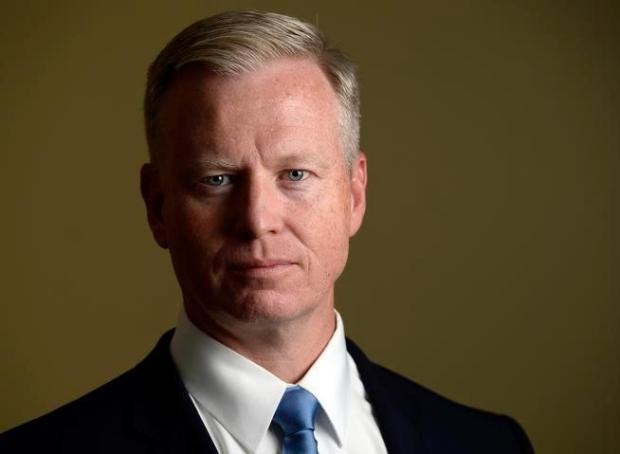In a proposal that one health expert is calling a “sad” illustration of how the response to the pandemic is being converted into a “partisan issue,” Arapahoe County area District Attorney George Brauchler is urging lawmakers to roll back Gov. Jared Polis’ (D-CO) power to fight the COVID-19.
“I think Gov. Polis ought to convene a task force to say, ‘How can we trim back my authority,'” said Brauchler recently on his Saturday morning “George Show” on KNUS radio. “You know that will never happen. We need to re-look at these public health orders. We need to look at how we give authority to these people.”
“Which liberty-loving legislator from either party will stand up and begin this important and needed conversation by offering a bill to claw back the massive authority given to the governor?” wrote Brauchler in a Denver Post opinion today.
Matthew Wynia, a Professor of Medicine and Public Health at the University of Colorado School of Medicine, says proposals like Brauchler’s are an “illustration of how the response [to the pandemic] has been increasingly converted into a partisan issue.”
“That’s sad because it shouldn’t be partisan,” Wynia wrote in an email to the Colorado Times Recorder. “Both Republicans and Democrats are dying of this illness – and we all care about the people in our families and communities who are at particular risk.”
“Also,” continued Wynia, “people in both parties are equally concerned with re-opening society as quickly as possible and reducing the harms the shut-down is creating, which are very real and which should not be downplayed at all. No one wants to keep the shut down in place, and no one is talking about keeping it in place forever or even indefinitely. The argument is whether to keep measures in place until we have the numbers going down, when we can do adequate testing and tracing, and when our health care system is ready for the inevitable increase in cases that will come with re-opening.
In questioning the wisdom of Colorado laws that give the governor broad power to respond to public health emergencies, Brauchler is aligning with Republicans across the country who are proposing legislation and filing lawsuits to roll back pandemic-related orders, like closing restaurants and requiring residents to shelter-in-place and wear masks.
In Colorado, Brauchler, who briefly ran for governor in 2018 before dropping out to launch a failed bid to be the state’s attorney general, appears to be the highest-profile Republican who’s proposing to trim Polis’ power.
State Rep. Rod Pelton, a conservative Republican from Eastern Colorado, said last month he’d like the General Assembly to “roll back” the governor’s power to issue public-health orders. He’d like to start on this when the legislature resumes next week, but it might have to wait until next year, he said.
Wynia called the type of legislative effort proposed by Pelton and Brauchler “purely political messaging” that has “no chance of success since the Democrats control both houses.”
“In that regard, it’s a waste of time at a moment when there are much more important things for legislators to be addressing,” wrote Wynia.
In his opinion column, Brauchler didn’t acknowledge that passing legislation now is next-to-hopeless with Democrats, including Polis himself, in charge of state government, but he did address the issue of legislators being too busy.
“And before the ‘we’re too busy’ crowd can claim that they have more important issues to address with their limited time, let me address those more pressing issues,” wrote Brauchler. “Outside of the state’s budget, an ironic victim of these very orders, what legislative action can result in as sweeping and devastating an impact on Coloradans as permitting a potential second, nearly unchecked shutdown of the state?”
Bruachler did not return a call for further comment.
Nationally, the most intense efforts to roll back the power of governors’ public-health orders, either via legislation or the courts, have occurred in key the presidential battleground states of Wisconsin, Michigan, and Pennsylvania, all of which have Republican-controlled legislative bodies and Democratic governors.
But Republican legislators in Ohio have targeted the authority of the state’s health director, leading fellow Republican governor Mike DeWine to tell them they should focus on coronavirus testing and the economy.
So far, actions to reduce gubernatorial power to fight the virus have failed nationally, according to James Hodge, director of the Center for Public Health Law and Policy at Arizona State University, but he predicted there will be “massive legislative and judicial battles ahead for the rest of the summer.”
Hodge, who helped develop model legislation designed to help state governments respond to health crises, said if roll-back efforts are successful, they could set back the government’s ability to deal with the pandemic.
When he drafted legislation, “governors essentially told us, ‘Spell out what powers we might have, and let our legislators consider that and pass these specific provisions, and we’ll act based on those specific legislative authorizations,'” said Hodge. “If you don’t spell that out, you create more chaos, not less,” he said.
It appears that Colorado law does not give more emergency powers to its governor than many other states, judging from comparisons available online and a review of emergency orders issued in other states.




